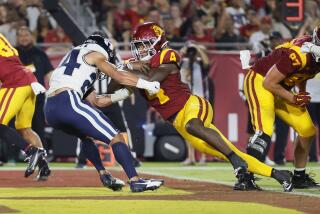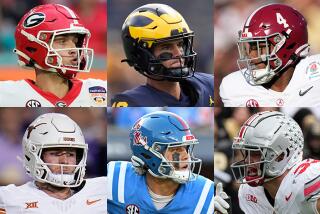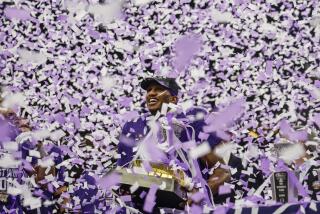Computers are messing with the BCS, but there’s no sense freaking out just yet
- Share via
Most years it takes four or five minutes for the Bowl Championship Series to make people heave plates of food across the room. This year, it took four or five seconds.
All hope for six ticks of serenity evaporated Oct. 17 when Oklahoma debuted at No. 1 in the BCS after debuting at No. 4 in the Harris Interactive poll.
What? Who died and made the computers king?
You might be wondering how, in consecutive weeks, the No. 1 team in the BCS was not ranked No. 1 or No. 2 in the polls.
So the question was taken straight to BCS executive director Bill Hancock, who offered this scientific explanation: “I can’t say strongly enough that these two weeks have been freaky.”
So there you have it: Blame it on freaky.
Freaky Week One (the prequel):
The experts predicted the week of Oct. 16 that Boise State was going to debut at No. 1 in the first BCS standings, alas proving that a screwy system can provide equal access to former junior colleges and should not be an antitrust lawsuit waiting to happen.
Freaky Week One (the unveiling):
Boise State opened No. 3.
Oklahoma, a serial offender when it comes to showing up unannounced on top of the BCS, bolted to No. 1 despite being no higher than third in any of the three major polls.
Turns out the experts who touted Boise State based their predictions on Ohio State staying No.1 in the polls. But, on Standing Release Eve, the Buckeyes lost at Wisconsin and No. 5 Nebraska was tripped up by Texas. That forced the voters to reconsider and computers to reconfigure, allowing Oklahoma to vault to No. 1 ahead of Oregon and Boise State, who were ranked 1-2 in the two BCS polls.
Which leads to a related question: If the polls are two-thirds of the BCS component, how does one-third — the computers — override them?
BCS officials were supposed to have tweaked the system to give more sway to the voters. This was a huge issue in 2003 when USC finished No. 1 in both polls but got pushed out of the BCS title game by Oklahoma, which was No. 3 in both polls.
A points system was then designed so that consensus in the polls would counterweight the computer component.
However, Oklahoma’s first-week computer lead was so large over Oregon and Boise State that it was enough to push the Sooners to the top.
Remember the operative word here: freaky.
“I can never remember any week when one team had such a significant advantage over teams competing against it in the computer rankings,” Hancock said.
But then it happened again.
Oklahoma lost to Missouri last Saturday, and Auburn jumped Oregon and Boise State to No. 1.
“I think the computer component gets moderated as the season goes along,” Hancock cautioned. “It’s a mistake to read too much into the first two weeks of the rankings.”
OK, but there are more questions.
•Did BCS officials consider using only the computers if there was no agreement in the polls?
Hancock said it has been discussed, but the sentiment was “you’re either going to use computer rankings or you’re not going to use them.”
•Do the six BCS computer operators have to divulge how their systems work?
No, and this is where it gets sketchy. We are left to trust the computer information being entered is valid. Hancock compares the computer guys not wanting to divulge the intricacies of their systems to Coca-Cola not revealing its secret formula.
Some Boise State fans were convinced BCS computer man Kenneth Massey gave too many points to Oregon during its open week at the expense of the Broncos, who routed San Jose State, 48-0.
Contacted this week, Massey said people may have misinterpreted his data. “There was no mistake on my end,” he responded in an e-mail.
•Is margin of victory having an impact on the standings?
Yes and no. BCS officials ordered MOV to be removed from the computers after the 2001 season. Meaning: The number nerds can’t account for the fact Oklahoma and Auburn had a few close-call, early-season wins — the reason those teams were likely ranked behind Oregon and Boise State in the polls.
The irony: Oregon’s national title drive in 2001 was derailed because margin of victory was in the formula — the Ducks won a lot of close games that year. Oregon finished No. 4 in the BCS despite finishing No. 2 in both polls.
This year, the lack of MOV has hurt Oregon, which has scored several lopsided wins, including a 60-13 decision over UCLA last Thursday.
Hancock said BCS conference commissioners discuss MOV every year but are intent on keeping it out of the computer component.
•Does USC being on probation hurt Oregon in the BCS standings?
No. All six BCS computers include USC data in their computations. After their ratings are completed, USC is removed, every team behind the Trojans moves up one spot and that’s what is used to compile the BCS standings.
Oregon is already No. 1 in the poll average, so a victory Saturday is not likely to change its status. USC cannot be ranked in two polls used in the BCS, but the Trojans are No. 24 in the Associated Press rankings.
“Give the voters credit,” Hancock said. “They know who Oregon is playing.”
Hancock’s final words of wisdom: “Sit down, take a deep breath. We’re two weeks into an eight-week process.”
Nothing guarantees that things are going to be cleared up Dec. 5, the day the final standings will be released.
Hancock: “I don’t think anyone can say what will happen on Dec. 5.”
The BCS wouldn’t want it any other way.
twitter.com/dufresnelatimes
More to Read
Go beyond the scoreboard
Get the latest on L.A.'s teams in the daily Sports Report newsletter.
You may occasionally receive promotional content from the Los Angeles Times.











